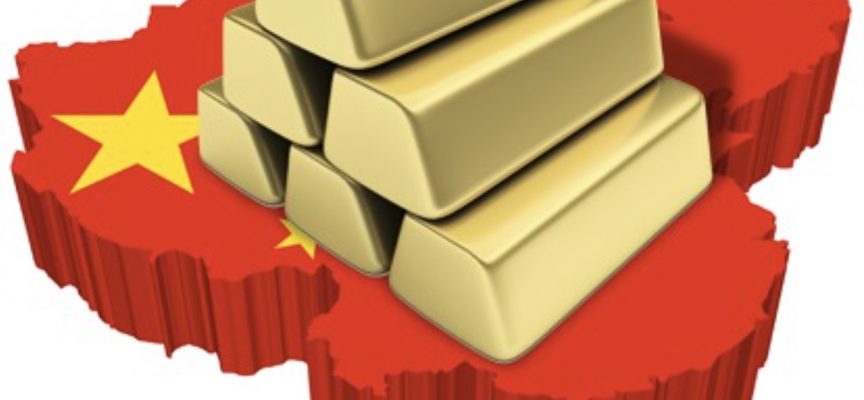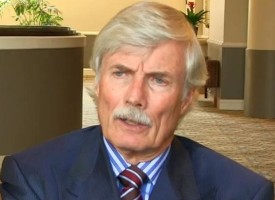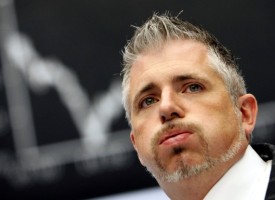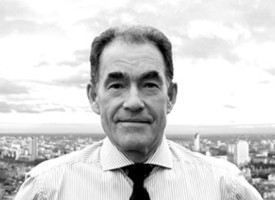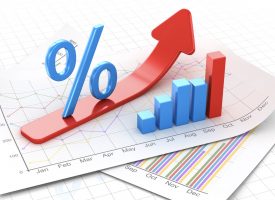One of the smartest policymakers in the world is getting ready to unleash China’s plan for a gold-centric monetary system. This will be a game-changer for the global monetary system and it will also unleash the price of gold.
One Of The World’s Smartest Policymakers
Stephen Leeb: “Zhou Xiaochuan, who has headed the People’s Bank of China for the past 15 years, is one of the world’s smartest policymakers and has been a key figure in the Middle Kingdom’s ascendancy this century. Zhou’s shrewdness and exceptional intellect have been on display during the 19th Communist Party congress now taking place in Beijing…
IMPORTANT:
To find out which company is the #1 junior mining takeover target in the world that the
biggest money on the planet is lining up to buy – CLICK HERE OR BELOW
Held every five years, the congress is a big deal. It sets out China’s policy goals for the next five years while also naming party leadership for those years and in some cases beyond. But like all things in China, while the messages conveyed at the congress are for the most part openly and honestly stated, there are additional messages that must be gleaned by parsing the nuances.
China’s Plan: A Gold-Centric Monetary System
A couple of days ago, Zhou showed the complexity of Chinese messaging. In a few words he warned his compatriots against complacency while subtly signaling to the West that major currency changes are necessary. As I see it, his remarks, while not saying so explicitly, set the scene for what I’ve long seen as China’s plan for a gold-centric monetary system, with the first step the launching of an Eastern oil benchmark denominated and traded in yuan, backed by gold. As I pointed out in a recent KWN interview, to a large extent the yuan already is backed by gold in that more than 90 percent of trades on the Shanghai Gold Exchange are settled in gold. I also have argued that the intense efforts by Russia and Saudi Arabia to export the most oil to China wasn’t an effort to shut down U.S. oil production from shale. Rather, I saw it as each country furiously competing to have as much of its own oil as possible represented in the forthcoming new Eastern benchmark.
In my latest KWN audio interview I pointed to Schlumberger’s comments on Friday that growth in shale production is slowing. I had expected a slowdown but not until very early next decade, so the comments took even me by surprise.
Back to Zhou’s comment, which John Authers of the Financial Times described “as close as someone in Mr. Zhou’s position can come to yelling ‘fire’ in a crowded theatre.” What Zhou said was:
“If we are too optimistic when things go smoothly, tensions build up which could lead to a sharp correction, what we call a ‘Minsky moment.’ That’s what we should particularly defend against.”
Who is this Minsky? He was an economist best known for arguing that a drawback of capitalism is that it allows for the build-up of debt, which in turn can propel asset values to unsustainable heights leading to the bursting of bubbles and the distressing aftermath. Clearly 2008 stands out as a Minsky moment. One thing that’s not clear, at least not from the quotes I’ve seen, is whether Zhou was talking only about China. But at a G20 meeting several days before the congress began, Zhou left little doubt that he felt China was on a path of strong, sustainable growth that would put its economy on far firmer footing:
“Fiscal revenues continue to grow, and prices remained stable. Moreover, deleveraging efforts have yielded early results, while economic growth continues to improve in terms of structure and quality, indicating China has made strong progress in restructuring the economy.”
 China Moving Away From Minsky Moment
China Moving Away From Minsky Moment
These are hardly the comments of someone worried about a ‘Minsky moment’ at home. If anything, the head of the PBOC (People’s Bank of China) was arguing that China was moving away from Minsky.
Still, Zhou’s comments a short time later during the party congress briefly rattled Chinese investors, with the market sliding sharply for a day followed by a quick recovery. Probably more important to Zhou, his comments got the attention of the Western press, with Bloomberg and other financial press headlining them. John Authers in his opinion piece for the Financial Times, added a strong cautionary note that the market’s quick recovery didn’t mean China was out of the woods.
Authers went so far as to say: “Invoking Minsky at the congress itself was the earliest possible point to send the message, and a sign of urgency.” In other words, contrary to what Zhou had said just a couple of days earlier, Authers pushed the view that China remains in a lot of trouble and will need to take heroic steps before its growth can be considered secure. Bloomberg, and no doubt many other outlets, picked up Zhou’s comments at the congress while ignoring his remarks at the G20 gathering.
Zhou’s references were to corporate debt in China, which according to the IMF rose to 166 percent of GDP in 2016 from 131 percent in 2012. Zhou said corporate debt was inflated because local governments had used state-owned enterprises or other corporate vehicles to raise money. That debt, he said, should have been classified as government debt – which is insured and not very high to begin with.
Zhou then said:
“We should seriously deal with and prevent the unhealthy use of financing vehicles and various debt-taking tools by local authorities.”
As I noted above, however, just a few days earlier he had said China was making progress in these areas. But investors and analysts are so focused on China’s problems that they were all too quick to settle on an out-of-context interpretation of the central banker’s assessment.
 Posturing For Launch Of Eastern Oil Exchange
Posturing For Launch Of Eastern Oil Exchange
My bet is that Zhou knew exactly what he was doing and how his remarks would be read in the West. In the wake of the party congress, Zhou’s comments will reinforce what so many Western analysts are prone to believe, i.e., that China is tottering. And if they see China as vulnerable, these analysts won’t make a fuss when the country starts trading Eastern oil in yuan, which thanks to existing mechanisms on the Shanghai Gold Exchange (SGE), which I referred to in an earlier interview, is easily backed by gold. Already anybody with a ticket to trade on the SGE has a ticket to exchange yuan for gold.
Ironically, Zhou’s warning of a Minsky moment was likely meant more as a warning to U.S. policymakers than to China’s leaders. John Authers came close to realizing this when near the end of his article he commented: “Writing in the 1970s, as Keynesian economics had gone badly wrong, Minsky wanted to argue that Keynes had been badly misinterpreted, and that control over inherently unstable banking and investment was necessary if capitalism was to work.” And in a direct quote from Minsky: “Socialization of the towering heights is fully compatible with a large, growing and prosperous private sector.”
Given these quotes, it isn’t stretching the point to believe that Minsky would likely be comfortable with the Chinese model that lets a form of capitalism flourish while the government controls the “inherently unstable banking and investment” industries. For evidence Minsky could add that according to Bloomberg and others China’s balance sheet is much stronger than America’s. For China about 80 percent of total debt is backed by bank deposits compared with 35 percent in the United States.
Zhou’s messages haven’t always been so subtly dual-purposed, as can be seen in a brief paper he wrote in 2009. He began by asking:
“What kind of international reserve currency do we need to secure global financial stability and facilitate world economic growth…Theoretically, an international reserve currency should first be anchored to a stable benchmark…. Its supply should be flexible enough to allow timely adjustment according to the changing demand.”
He goes on to offer a possible example:
“Back in the 1940s, Keynes had… proposed…an international unit named ‘Bancor’, based on the value of 30 representative commodities….The collapse of the Bretton Woods system…indicates that the Keynesian approach may have been more farsighted.”
In the same paper Zhou also indicated he was in favor of giving a greater role to a basket of currencies such as the SDR, a role similar perhaps to that envisioned for the Bancor. “Special consideration should be given to giving the SDR a greater role.” Perhaps completing the picture, he noted:
“The creation of an international currency unit, based on the Keynesian proposal, is a bold initiative that requires extraordinary political vision and courage.”
 China’s Move Will Unleash The Price Of Gold
China’s Move Will Unleash The Price Of Gold
This characterization – vision and courage – seems to me an exhortation to all world leaders to come together. As I’ve said before, I would guess that China’s vision of a new reserve currency would have a gold-backed yuan just as an initial step. The end goal would be a basket of currencies that would include gold and that might be backed by a basket of commodities a la Keynes and at least partially managed via a complex blockchain. In such a system gold would likely float against the other basket members and clearly emerge as the component that balances supply and demand. This implies a value for gold that is eventually exponentially higher than today – especially as commodity scarcities emerge, which to me seems a near certainty in a growing world.”
***ALSO JUST RELEASED: EVIDENCE: Stock Market Crash Is Coming. Plus A Look At Gold & Bitcoin And Gold & Levitating Asset Prices CLICK HERE.
***KWN has now released the remarkable audio interview with Dr. Stephen Leeb discussing the catalyst for a mega-bull market in silver, the takedown in the metals, oil and much more CLICK HERE OR ON THE IMAGE BELOW.
© 2017 by King World News®. All Rights Reserved. This material may not be published, broadcast, rewritten, or redistributed. However, linking directly to the articles is permitted and encouraged.

